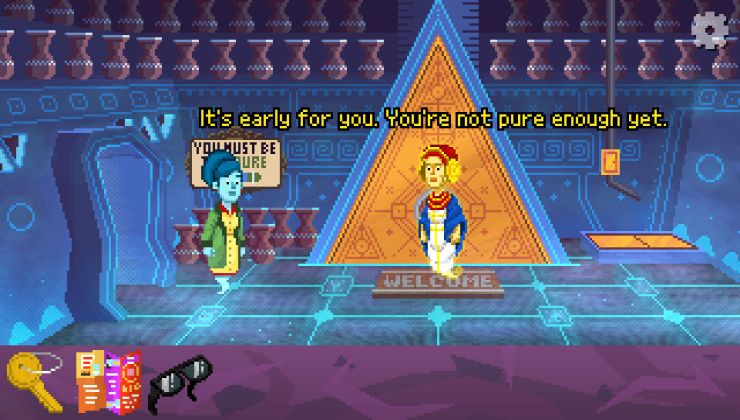While most of Linux gaming revolves around Steam, SteamOS and Steam Deck. GOG and Epic Games can be run on Linux platforms too - here's how.
Neither store actually offers a Native Linux client of their launchers, so you have two main options here. For Steam desktop and SteamOS users, you can actually install both GOG Galaxy and Epic Games using Steam. The other (better) option is to use a third-party client like Heroic Games Launcher or Lutris. I'll go over the options below.
Before jumping ahead though, specifically for the Epic Games Store, keep an eye on our anti-cheat compatibility page as a number of games like Fortnite will not work due to the anti-cheat used.
JUMP TO
Heroic Games Launcher
Thus is by far the simplest option. It has the cleanest UI and is just the easiest to use and supports GOG, Epic Games and Amazon Prime Games too.
Installation
Flatpak
The simplest solution! It's available as a Flatpak via Flathub which is available for nearly every Linux distribution. If you're on SteamOS / KDE Plasma it's available via the Discover software app (see my previous guide on installing software on SteamOS / Steam Deck).
Or via your terminal app like Konsole:
flatpak install flathub com.heroicgameslauncher.hgl
It will then show up in your app menu.
AppImage
The other option is AppImage available to download from the Heroic website. If you're using the AppImage, you will need to set it as Executable. To do so, locate the AppImage in your Downloads folder, right click -> Properties -> Permissions and tick the box.

Note: if you're on Ubuntu / Kubuntu and you're trying to load the AppImage and nothing happens, it's because of a security feature that distribution's developers added. It happens mostly to Electron-based apps in an AppImage. You need to run it using "--no-sandbox". Example in Konsole terminal for the latest release at time of publishing:
./Heroic-2.17.2-linux-x86_64.AppImage --no-sandbox
Using the Heroic Games Launcher
The first thing you'll need to do is add an account and it will directly walk you through the steps to do so.

When you click the "here" or select "Log in" from the left sidebar, you'll be given the direct options for each store. The logins are built in, so you do it all inside the app. Afterwards it will begin to sync up your games.

Once you login, that's basically it and you're done. Heroic really does make it simple that this part of the guide is merely to remind people it exists.

If you want to add the games individually into Steam (so you don't have to load up the Heroic Games Launcher each time), say you're on a SteamOS device — there's an option for that too. You have to click on the game (don't launch it) and on the game page there's a three dot menu in the upper right corner, click that and a drop-down menu will appear that has "Add to Steam" as an option. You may need to close and re-open Steam for it to show up.

Lutris
Lutris is another rather popular game manager. It's a fair bit more feature-filled compared with Heroic Games Launcher, and at times can be a bit more difficult to use. Lutris also has support for a lot more use-cases including GOG, Epic Games, Steam, Humble Bundle, Ubisoft Connect, Wine, Emulators and the list goes on.
Installation
Flatpak
The simplest solution! Same as Heroic Games it's available as a Flatpak via Flathub which is available for nearly every Linux distribution. If you're on SteamOS / KDE Plasma it's available via the Discover software app (see my previous guide on installing software on SteamOS / Steam Deck).
Or via your terminal app like Konsole:
flatpak install flathub net.lutris.Lutris
It will then show up in your app menu.
Alternatively there's various distribution packages available on the Lutris website.
Using Lutris
Unlike Heroic, for the likes of Epic Games Store, Lutris does not integrate it. Instead, it will set up installing the Windows version of the Epic Games Store. It does integrate GOG games directly into the launcher. Lutris works via various automated scripts, so it does all the store setup for you. It makes things look a bit more complicated than they are.
All you have to do is follow the on-screen instructions once you've picked a store in the side-bar and hit the download and login buttons as it goes through it for each store.

Lutris also has a useful feature of adding game shortcuts to Steam. When you've installed a game, simply right click -> Create steam shortcut.
You may need to close and re-open Steam for it to show up.

Inside Steam
If you wish to use the official store apps, you can use Valve's Proton compatibility layer to install them inside of Steam. Your mileage may vary here, as the apps can be a little finicky inside of Proton and will break at random with updates to each of them. Which is why this should be a last resort and I don't generally recommend it. I'm simply including it here for completeness of all options.
The example I'll be using will be the Epic Games Store but it will apply to GOG (and any other Non-Steam app) just the same. Note: at time of edit only Proton Experimental works for the Epic Games Store. See my guide to all the different Proton versions for help.
Annoyingly, Epic Games actually hide the download link if you're on a Linux system. You can either use a browser plugin like User Agent Switcher (Chrome / Firefox) and pretend you're on Windows to get it. Or, you can try this download link that I'll try to keep updated with the official download location direct from Epic.
Once you have it, you can then add the installer file into Steam. Click "Add a game" in the bottom left corner and then "Add a Non-Steam Game".

You'll get this box below pop up and you'll want to select Browse to open the file manager.
When you hit Browse, make sure it's set to "All files" so that the Windows installer will show up so you can then select it.

Then just hit Open. And you'll be sent back to the previous screen, where you may need to scroll down in the list to see it selected and you can hit "Add Selected Programs".

You'll then have the EpicInstaller app show up in your Steam Library. For this next bit to work, you'll need to go into the right click -> Properties menu. Select the Compatibly tab, and force the latest Proton on it.


This will allow us to then actually run it, which will load the store installer. Follow the steps in the installer and wait for it to finish. Once done, it will just vanish and bring you back to your Steam Library.
What it will actually do in the background is create a new Proton prefix folder with the installed launcher. This will be inside a location like this (~ being your home folder):
~/.steam/steam/steamapps/compatdata/
The .steam is a hidden folder, so you'll need to unhide folders in your home to see it. If you're on KDE Plasma, it's CTRL+H to toggle hidden files / folders.
The problem here is that Steam will give it a longer random number, since it's not a game available on Steam. You'll need to find the most recently created folder in here, so just sort your file manager by creation date for the folders. In this example the folder number Steam made was 2586663209.

Inside there go into:
/pfx/drive_c/Program Files (x86)/Epic Games/Launcher/Portal/Binaries/Win32/

Which is where you'll find the Epic Games Launcher installed executable. This next step is important, as we'll update our shortcut in Steam to point to it. Do not delete the installer launcher shortcut in Steam, update it, otherwise you'll lose it all. On KDE Plasma, we can simply right click -> Copy Location on the EpicGamesLauncher.exe file.
Now in Steam, find the EpicInstaller in your Steam Library again. Right click -> Properties and then update the location from the installer to the installed location above like pictured below. Important: ensure they're both in quotes because of the space in the Epic Games name, otherwise it will not work:
You can also rename it here and add an image to it if you wish.
After that, you're good to go, as long as the launcher works in Proton. As mentioned previously, launcher updates can and will break them running in Proton so you have to wait for fixes from Valve. It's better to use third-party clients.
More Options
As a quick shout-out for those who only use GOG and want something simple, the Minigalaxy app could also be a good option for you.
Another option is NonSteamLaunchers to set up various stores for you, but it puts everything into a single Proton prefix which could potentially cause problems on launcher updates and if you need to change Proton versions it will affect all of them.
https://github.com/Heroic-Games-Launcher/HeroicGamesLauncher/issues/4605
A second question, is it possible to add the whole Heroic/Lutris UI to Steam instead of individual games, and still control it using gamepad, when I start it from the Steam Deck gaming mode?
Yes you can add anything to Steam too like Heroic.
Personally I can't stand the UIs of either Heroic or Lutris, and the vast majority of the time it's simple enough to just add them to Steam with most of my other games anyway.
Still should be mentioned more obvious in the title
Last edited by tpau on 4 Jul 2025 at 4:58 am UTC











 How to setup OpenMW for modern Morrowind on Linux / SteamOS and Steam Deck
How to setup OpenMW for modern Morrowind on Linux / SteamOS and Steam Deck How to install Hollow Knight: Silksong mods on Linux, SteamOS and Steam Deck
How to install Hollow Knight: Silksong mods on Linux, SteamOS and Steam Deck